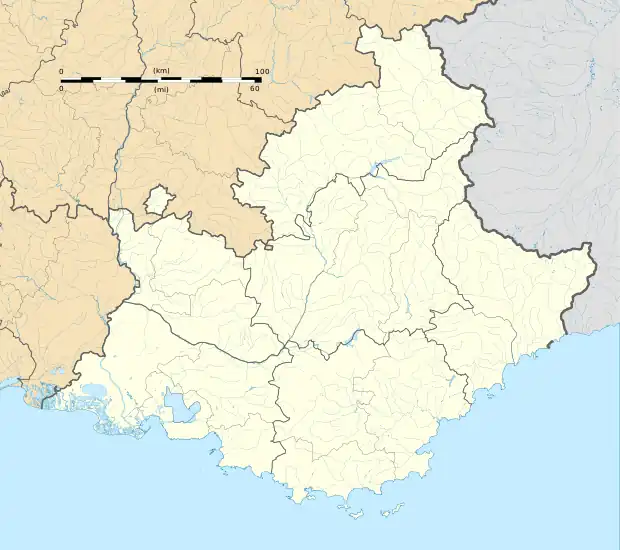Flayosc
| |
|---|---|
.JPG.webp) A view of the town from the road to Colle | |
 Coat of arms | |
Location of Flayosc | |
 Flayosc  Flayosc | |
| Coordinates: 43°32′06″N 6°23′51″E / 43.535°N 6.3975°E | |
| Country | France |
| Region | Provence-Alpes-Côte d'Azur |
| Department | Var |
| Arrondissement | Draguignan |
| Canton | Flayosc |
| Intercommunality | CA Dracénie Provence Verdon |
| Government | |
| • Mayor (2020–2026) | Karine Alsters[1] |
| Area 1 | 45.95 km2 (17.74 sq mi) |
| Population | 4,354 |
| • Density | 95/km2 (250/sq mi) |
| Time zone | UTC+01:00 (CET) |
| • Summer (DST) | UTC+02:00 (CEST) |
| INSEE/Postal code | 83058 /83780 |
| Elevation | 140–752 m (459–2,467 ft) (avg. 235 m or 771 ft) |
| 1 French Land Register data, which excludes lakes, ponds, glaciers > 1 km2 (0.386 sq mi or 247 acres) and river estuaries. | |
Flayosc (French pronunciation: [flajɔsk]; Provençal Occitan: Flaiòsc) is a commune in the Var department in the Provence-Alpes-Côte d'Azur region in Southeastern France.
Geography
Flayosc is 7 km (4.3 mi) west of Draguignan, about 35 km (22 mi) from the Mediterranean Sea (to the southeast).
The town is located on a rocky hill, near the church. Three small rivers crosses the village : the Pontchalade, the Florieyes and the Rimalte.
History
Antiquity
The place allowed local residents to watch over the valley and to protect villages in the neighbourhood, for example Saint-Lambert (far from 5 km).
After the destruction of Antea, a village in the neighbourhood, by the Roman Empire, people decided to live in this place.
Since 1789
The lord of Flayosc lost his powers and his castle during the French Revolution.
In the 19th century, the village became a place where shoes were made : many factories were created. The village had, thanks to this activity, a long prosperous period. About 3,000 people lived in Flayosc in 1914.
Population
| Year | Pop. | ±% p.a. |
|---|---|---|
| 1968 | 1,454 | — |
| 1975 | 1,867 | +3.64% |
| 1982 | 2,384 | +3.55% |
| 1990 | 3,233 | +3.88% |
| 1999 | 3,924 | +2.18% |
| 2007 | 4,341 | +1.27% |
| 2012 | 4,366 | +0.11% |
| 2017 | 4,294 | −0.33% |
| 2020 | 4,195 | −0.77% |
| Source: INSEE[3] | ||
Natural patrimony, fauna and flora
The village is classified in Zone Natura 2000 and in Zone Naturelle d'Intérêt Ecologique, Faunistique et Floristique.
Twin towns
 Vezza d'Oglio since 2002
Vezza d'Oglio since 2002
Bibliography
- Charles-Laurent Salch, Dictionnaire des châteaux et fortifications de la France au Moyen Âge, ed. Publitotal, reprint 1991, page 478.
See also
References
- ↑ "Répertoire national des élus: les maires" (in French). data.gouv.fr, Plateforme ouverte des données publiques françaises. 13 September 2022.
- ↑ "Populations légales 2021". The National Institute of Statistics and Economic Studies. 28 December 2023.
- ↑ Population en historique depuis 1968, INSEE
External links
- (in French) Statistics
- (in French) Local council of Flayosc
- (in French) Map of Flayosc
- (in French) Architectural patrimony on the site of French Ministry of culture
- (in French) Protected patrimony of Flayosc
- (in French) Site of the regional Office of Ecology